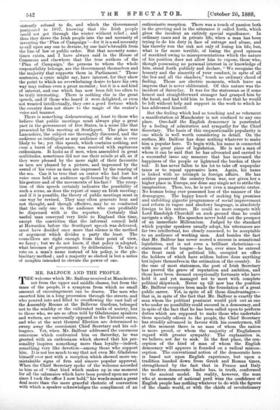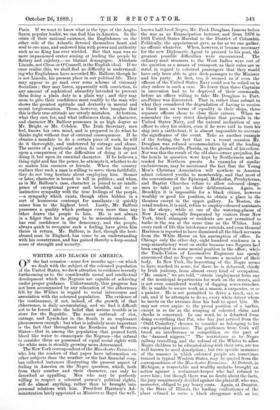MR. BALFOUR AND THE PEOPLE. T HE welcome which Mr. Balfour
received at Manchester, not from the upper and middle classes, but from the mass of the people, is a symptom from which no small amount of encouragement can be drawn. The men who escorted him in a long procession through the streets, and who poured into and filled to overflowing the vast hall of the Assembly Rooms at the Bellevue Gardens, belonged not to the wealthy or the cultivated ranks of society, but to those who, we are so often told by Gladstonian speakers and writers, are universally opposed to the Unionist cause, and who at the next General Election are determined to sweep away the coercionist Chief Secretary and his col- leagues. Yet, when Mr. Balfour addressed the enormous concourse which confronted him on Saturday, he was greeted with an enthusiasm which showed that his per- sonality inspires something more than loyalty—indeed, something very like devotion—among those who support him. It is not too much to say that not even Mr. Gladstone himself ever met with a reception which showed more un- mistakable signs of firm and sincere popular approval. When the Chief Secretary spoke of the welcome accorded to him as of " that kind which makes up in one moment for all the calumnies which have been poured upon me ever since I took the office I now hold," his words meant a great deal more than the mere graceful rhetoric of convention with which a speaker acknowledges the compliment of an enthusiastic reception. There was a touch of passion both in the greeting and in the utterance it called forth, which gives the incident an entirely special significance. In ordinary cases and in private life, when a man has been trying to do his duty in face of outrage and abuse, and has thereby run the risk not only of losing his life, but, what is far more terrible, of losing the good opinion of mankind owing to misrepresentations which the nature of his position does not allow him to expose, those who, though possessing no personal interest in or knowledge of him, stand forth publicly and declare, " We recognise the honesty and the sincerity of your conduct, in spite of all the lies and all the slanders," touch no ordinary chord of feeling. Those are electric moments, which leave an impress that is never obliterated. Of this nature was the incident of Saturday. It was for the statesman as if some honest and straightforward stranger had grasped him by the hand, and had told him to have no fear that he would be left without help and support in the work to which he has addressed himself.
But the feeling which had so touching and so vehement a manifestation ant Manchester is not confined to any one place. One-half the English democracy is penetrated by a feeling of admiration and sympathy for the Chief Secretary. The basis of this unquestionable popularity is one which is well worth considering in detail. On the surface, Mr. Balfour has done nothing whatever to make him a popular hero. To begin with, his name is connected with no great piece of legislation. He is not a man of whom it can be said that he has advocated and carried to a successful issue any measure that has increased the happiness of the people or lightened the burden of their toil. It has never fallen to his lot to take off unpopular taxes or to repeal oppressive laws. Again, his name is linked with no triumph in foreign affairs. He has neither preserved the country from war, nor given her a higher place in Europe, nor done any single act to strike the imagination. Then, too, he is not even a magnetic orator. No human being ever possessed less of the manner of the demagogue. The happy knack of making big promises and unfolding gigantic programmes of social improvement and reform in vague and shadowy language, is absolutely foreign to his nature. He could no more compete with Lord Randolph Churchill on such ground than he could. navigate a ship. His speeches never hold out the prospect of an immediate Millennium. Judged by the standard which popular speakers usually adopt, his utterances are far two intellectual, too closely reasoned, to be acceptable to an audience of working men. And besides the fact that Mr. Balfour has never scored a success in sensational legislation, and is not even a brilliant rhetorician—a statesman of the tongue—he has, ever since he entered the front rank of political life, occupied an office the holders of which have seldom before done anything but injure themselves in the estimation of the country. In the case of most statesmen, the post of Irish Secretary has proved. the grave of reputation and ambition, and those have been deemed exceptionally fortunate who have held it and yet managed not to meet with complete political shipwreck. Never up till now has the position Mr. Balfour occupies been made the foundation of a great public career. Yet, in spite of all these disadvantages— that is, in spite of the fact that Mr. Balfour is exactly the man whom the political pessimist would pick out as one who under no possibility could succeed in a democracy, and in spite of the fact that he has been called upon to perform duties which are supposed to make those who undertake them specially odious to the people, the Chief Secretary has steadily advanced in favour with his countrymen, till at this moment there is no man of whom the nation is more proud, or whom the majority of Englishmen regard with greater sympathy. The explanation is, we believe, not far to seek. In the first place, the con- ception of the kind of man of whom the English democracy will approve is founded on a radical miscon- ception. The conventional notion of the democratic hero is based not upon English experience, but upon a tradition handed down from Greek and Roman times, strengthened by the fact that in France and Italy the modern democratic leader has, in truth, conformed to the ancient model. In reality, however, the man who at moments of national peril wins the confidence of English people has nothing whatever to do with the figures of the classic world, or with the chiefs of revolutionary Paris. If we want to know what is the type of the Anglo- Saxon popular leader, we can find him in America. In the crisis of their national existence, the Englishmen on the other side of the Atlantic devoted themselves heart and soul to one man, and endowed him with power and authority such as no King has ever wielded. But that man was no mere impassioned orator aiming at leading the people by flattery and cajolery,—no blatant demagogue. Abraham Lincoln, not Cleon or O'Connell, is the English ideal. If we once realise this, we shall find no difficulty in understand- ing why Englishmen have accorded Mr. Balfour, though he is not Lincoln, his present place in our political life. They may appear to go mad over some scheme of visionary Socialism ; they may listen, apparently with conviction, to any amount of sophistical absurdity intended to prevent them doing a plain duty in a plain way ; and they may seem to give their confidence most readily to the man who shows the greatest aptitude and dexterity in mental and moral tergiversation. Those, however, who imagine that this is their true attitude are utterly mistaken. At bottom, what they care for, and what influences them, is character, and character Mr. Balfour possesses in as high degree as Mr. Bright or Mr. Cobden. The Irish Secretary, men feel, knows his own mind, and is prepared to do what he thinks right without fear of external consequences. If he obtains a mandate to do a certain piece of work, he will do it thoroughly, and undeterred by outrage and abuse. The merits of a particular action do not for him depend upon a comparison of the difficulties of doing it or not doing it, but upon its essential character. If he believes a thing right and has the power, he attempts it, whether to do so makes him enemies or friends. When the country realises that such a man is willing to serve them faithfully, they do not long hesitate about employing him. Sooner or later, character is bound to tell in politics ; and when, as in Mr. Balfour's case, character is joined to an intelli- gence of exceptional power and breadth, and to an instinctive sympathy with the true feelings of the people, —a sympathy which exists, though often hidden in a sort of humorous contempt for assailants—it quickly raises him to the highest level. Lastly, Mr. Balfour possesses a quality which perhaps even more than any other draws the people to him. He is not always in a fidget that he is going to be misunderstood. He has real confidence in the democracy, and the people, always quick to recognise such a feeling, have given him theirs in return. Mr. Balfour, in fact, though the best- abused man in England, has come to an understanding with his countrymen, and has gained thereby a deep-seated sense of strength and security.







































 Previous page
Previous page